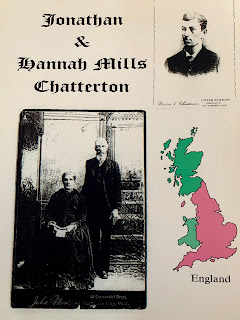Love Came Down, a Christmas Story
Five generations back, my great grandmother, Hannah, who was three months pregnant, travelled with her young son and daughter, on a rickety small pox infected ship from Manchester, England to Upper New York state. Her daughter died on that ship. She left her husband behind because he had to work to earn money. She also left all of her extended family, parents and brothers, cousins, everyone. She and her son continued their lonely journey across the St. Lawrence seaway by boat and train, eventually ending up near St. Louis. She then walked 1300 miles, in her last trimester of pregnancy, across the plains to her destination, Salt Lake City, Utah. Her baby, my great great grandfather Jacob Chatterton, was born three weeks later.
I think of my five times great grandmother, and her journey of faith, when I think of Mary on this Christmas Eve night. I think of their strength. I think of their faith. There are differences of course, my grandmother was an extraordinary human being, but she was not the Theotokos, she did not birth God into the world. My grandmother birthed an ordinary human being who grew up, married, had a bunch of kids, and died from a tick bite, from Rocky Mountain spotted fever.
Over the years as I have driven across the plains to Utah, I think of Hannah, and others like her, walking across that expanse of land, how difficult it must have been, and was it worth it?
On this holy night, I invite you to suspend your logic and enter into the story, they mystery of the birth of Jesus. Imagine being Mary and Joseph, traveling the distance from their home in Jerusalem to Bethlehem. There would have been a crowd of people traveling with them. And they would have stayed with family when they arrived because Joseph was from Bethlehem and he would have had family there. But of course the house was full and they arrived late and they had to sleep in the family room, with other people and the array of animals owned by the family.
When Mary went into labor there would have been midwives to help her. Jospeh would have left the room while the women helped her deliver her baby and wrapped him in swaddling cloths.
I’ve given birth twice and I have a clear sense of how that night went, of the pain, the messy birth, and the relief when labor was over and both mother and child were alive and well.
For Mary, knowing that they baby she birthed was God, that she, the Theotokos, the God-Bearer, was, in the mystery of the Christian story, literally bearing God into the world. Imagine how she felt, holding that baby, flesh of her flesh, and more. The baby who had her eyes and her nose and her coloring, fully human. And yet more, because he was also fully divine, God. This son, this God in human flesh, she was love and raise and teach him at the wedding in Cana to use his gifts, to support him in his ministry on earth, his ministry of teaching us about God’s love for human kind, a love so deep so real that this God would risk everything to live as one of us. Live as one of us so that this God could love us more and we love this God more in return.
The Christian story is a story of love and a story of relationship. It’s an earthy, smelly, messy love and relationship. It’s a story of hope. Hope for you and me and for this world. Even in the worst of times, because God lived among us in human flesh, human beings can find hope. Because God continues to live on in and through us. God chose the incarnation, chose to express God’s self in human beings, in and through us. We are not God. But we are called to believe that we too are birthing God into the world, that God lives in and through us, in and through our words and our actions, and in and through our love for one another. In moments of despair, when all seems lost, I remember that God has chosen to live in and through me, and you. And then, I cannot give up hope. Instead I choose to live with hope and in love. To believe like my grandmother Joanna, and Mary the Theotokos, that God is with us. God so loved the world that God came to live among us. May hope sustain us and love prevail.




Comments